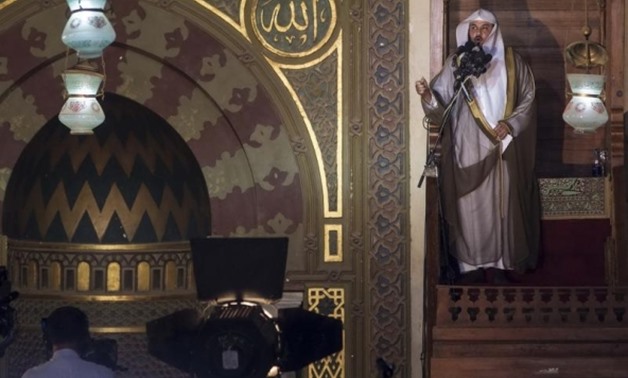
(Saudi preacher Mohamed al-Eraify speaks during Friday prayers in Amr Bin Aaas mosque in Cairo June 14, 2013. REUTERS/Mohamed Abd El Ghany)
CAIRO – 14 March 2018: A draft law on regulating fatwas (Islamic edicts), which Parliament’s Religious Committee will call for consideration in the next plenary session, might put an end to a series of groundless fatwas issued by unlicensed and unqualified preachers in the media. The move aims to further reform religious discourse.
This is a part of Egypt’s efforts to fight terrorism, extremist ideology and odd fatwas that incite sedition.This is in light of the recent increase in the number of edicts issued and the number of people preaching about religious habits on everything in social media. A mishmash of opinions has raised some controversies and questions among Egyptians.
In a statement before the conference entitled “The role of fatwas in stabilizing the society” from October 17 to 19, Grand Imam of Al-Azhar Ahmed al-Tayeb said that Egypt nowadays is facing an unprecedented wave of distortion of Islam’s teachings issued by unlicensed persons.
“Unfortunately, some have been allowed to issue flawed fatwas that distort Islamic Sharia and violate Islam's true teachings," said Tayeb.
Hence, Parliament’s Religious Committee is calling for a discussion on the draft law to regulate fatwas in the upcoming plenary session in order to fight the chaos of odd fatwas.
Article 1 in the draft law stipulates that it is prohibited to deal with any fatwa unless it is issued by Islamic clerics from the Council of the Grand Scholars of Al-Azhar, Dar Al-Iftaa (Egypt's central authority for issuing religious rulings), the Islamic Research Complex or the General Fatwa Department at the Ministry of Religious Endowments, or whoever is licensed to do so in accordance with the procedures specified in the draft law’s executive regulations.
According to Article 2, religious learning and preaching at Al-Azhar cannot be considered fatwas.
Furthermore, Article 3 stresses that the members of the above institutions can deliver fatwas only via licensed media outlets, and any violators can be jailed and fined.
The religious committee issued the draft law in May 2017 to establish unified standards for pronouncing fatwas, but it has not been discussed in the plenary session.
Osama El-Abd, head of Parliament’s Religious and Endowments Affairs Committee, told Egypt Today that there is no reason for delaying the review of the draft law in the plenary session, and that the committee is issuing other draft laws.
Abd stressed that the draft law complies with all religious institutions, and Egypt's Grand Mufti Shawki Allam, Secretary-General of the Islamic Research Academy Mohie Ed-deen Afifi Ahmed Abdel-Majeed and the Religious Endowments Minister Mohamed Mokhtar Gomaa attended the discussion of the draft law with the committee.
The most controversial fatwas that have recently appeared in Egypt varied from endorsing necrophilia to intercourse with animals.
These fatwas have been debated and have caused some backlash. In response, Deputy Minister of Religious Endowments Fouad Abdel Azim said that these fatwas are odd and aim only to stir controversy among the public.
Abdel Hamid Al-Atrash, former head of the Edicts Committee at Dar Al-Iftaa, stirred controversy when he declared that any person who could find any treasure or antiquity can keep it.
This fatwa was refused by many Muslim scholars, as it encouraged illegal excavation and thievery of Egypt’s heritage.
In the political field, Al-Azhar University Professor Sheikh Mahmoud Shaaban issued a controversial fatwa in 2013 that any opposition that aims to bring down a leader elected by the public should be punished by death.
Later, the Public Prosecution opened an investigation against him.
In addition, Grand Mufti Shawki Allam declared that trading in the cryptocurrency Bitcoin is unlawful in accordance with Islamic Sharia.
The most recent fatwa stirring controversy was against footballer Mohamed Salah. A Salafist preacher, Hisham al-Bayli, called on Salah to leave football for conversion, describing his prostration after scoring goals as illegitimate and away from Islamic teachings.
In response, Parliament’s Religious Committee refused this fatwa, referring that it cannot be considered a fatwa as it is not issued by Al-Azhar, Dar Al-Iftaa, or any licensed institution or individual.
Fatwas are Islamic religious rulings issued by a recognized religious authority or individual based on the Holy Quran and the Prophet’s teachings for guidance on the routine of daily life subjects such as marriage and inheritance.
In Egypt, Dar Al-Iftaa, under the Ministry of Justice, is the official institution devoted to providing fatwas on its website, along with the clerics of specialized offices at Al-Azhar, Egypt's top religious authority. For example, all court sentences of death must be approved by Dar Al-Iftaa.
To resolve this problem and limit fatwas in Egyptian television, Al-Azhar and Dar Al-Iftaa are set to prepare a list of only 50 scholars and clerics who are permitted to issue fatwas on Egyptian television and media.
Al-Azhar set up fatwa kiosks in Cairo metro stations to offer religious advice to commuters and fight extremist ideas. It focused on daily life such as marriage, divorce and inheritance, as well as correcting misinterpretations of Islam.
Under the leadership of President Abdel Fatah al-Sisi, Egypt has set a strategy to fight extremism. In 2014, Dar Al-Iftaa launched a department to monitor Islamist edicts spreading across Islamic countries.
In August 2015, Dar Al-Iftaa held an international conference, “Fatwas: The Realities, Challenges and Prospects for the Future”, in August 2015 to confront the “chaos of fatwas,” which brought together 50 muftis from across the Islamic world.
Comments
Leave a Comment